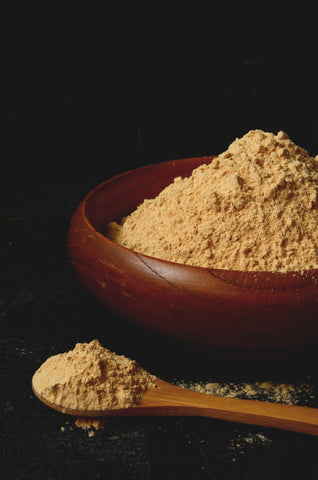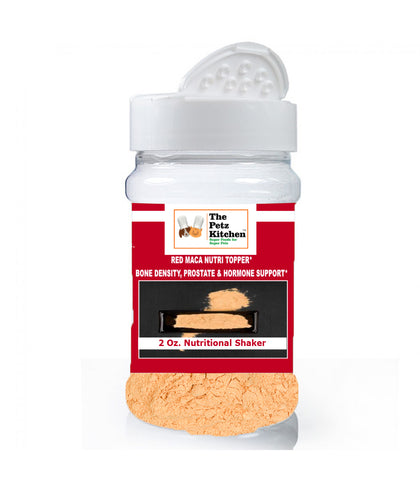RED MACA - BONE PROSTATE & HORMONE SUPPORT* THE PETZ KITCHEN™ - Organic Ingredients for Home Prepared Meals & Treats
SKU: PKITCHREDMACA2OZTHE PETZ KITCHEN™ ORGANIC RAW RED MACA is a tuberous root that grows in the Andean Highland Mountains at altitudes of up to 15000 feet, under some of the most severe weather conditions found on the planet.
RED MACA has been qualified by the World Health Organization (WHO) as one of the most important complete and sustainable protein sources found on earth. It is also the rarest and most valuable Maca varietal.
Maca has a history of use for animals for over 3,000 years and has been widely researched for its nutritional and potential health benefits for dogs, cats, small animals and horses.
Because of the extremes in sun, wind and snow that RED MACA is exposed to, it produces a stunning array of over 55 natural phytochemicals, and represents one of the planet's truly sustainable and complete protein sources.


Journal of Veterinary Medicine & PetfoodIndustry recognize Maca's health benefits for dogs and cats
RED MACA is prized as a water and fat soluble super food and broad spectrum antioxidant power house, containing all essential bio-available amino acids, fatty acids, adaptogen actions, the highest concentration of glucosinolates, polyphenols, digestive enzymes, alkaloids, bio-available protein, vitamins, minerals, sterols and critical nutrients, making it an ideal health boosting addition to all life stage diets.
RED MACA has been attributed with the most pronounced potential health benefits related to its marked concentration of glucosinolates, which is directly related to bone mineral density, and may have a regenerative effect on connective tissue and bone health. This is vital not only to your pet's bones, cartilage, tendons, connective tissues, but also the skeletal framework, neural pathways but even myelin sheath that feeds the Central Nervous System as well as delicate eye tissues that feed the retina and macula.
RED MACA has also been studied for its effects to potential support healthy prostate function in male animals, may help support prostate function and may help limit prostate inflammation.
RED MACA also has a role in its potential health benefits related to endocrine support specific to the hypothalamus, pituitary, adrenal and thyroid glands, the master glands in the body. The hypothalamus and pituitary glands help regulate all other glands in the body, including producing and maintaining hormones, which are required for every body system to operate properly. All colors of Maca root may exert some effect on the endocrine system, but YELLOW MACA likely has the most consistent, well known actions in terms of supporting endocrine health.
RED MACA may possibly help stimulate, nourish and rebuild glandular tissues, important in conditional needs related to Cushing’s, Addison's and diabetes, may help reduce metabolic stress, may help provide cognitive support and may help boost vitality.
RED MACA's adaptogen plant content is used holistically to help improve your pet's resistance to metabolic, oxidative, physiological, biochemical, physical, emotional, environmental, immune, central nervous and neurological stress and dysfunction, due in part, to its alkaloid and amino and fatty acid content which may help nutritionally support the endocrine system.
While all forms of Maca have phytochemical and nutritional benefits, here are the areas RED MACA shines:
1. Energy. While all colors of Maca may potentially helps support many parts of the bod, RED MACA takes the prize.
2. Yellow, Red and Black Maca all help lend bone health and support however, RED MACA has the most pronounced action on joint health.
3. While all 3 forms of Maca may help nourish prostate health, RED MACA gets the prize for prostate health.
4. While RED MACA may help nourish brain and cognitive function, BLACK MACA gets the prize for performance and nutrition.
An additional benefit in adding RED MACA to your pet's diet is its studied effects to help signal your dog and cat's Endocannabinoid system, providing your dog and cat with potential layered therapeutic effects in a single treat or meal.
Please enjoy a video which shows how you can make tasty and healthy maca ball cookies for your dog or cat.
RED MACA contains an impressive array of potential health supportive organic whole foods and antioxidants, plus all essential and non-essential amino acids, first class adaptogens and plant botanicals, alkaloids, 20 free fatty acids (linoleic and oleic acid), lysophosphatidic acids (LPA), digestive enzymes, isothiocyanates, bio-available protein, glucosinolates, minerals (critical macro and micro minerals), including iron, magnesium, calcium, copper, iodine, iron, manganese, phosphorus, potassium, sodium, zinc, saponins, tannins; a variety of sterols (including sitosterol, campestrol, ergosterol, brassicasterol and ergostadienol) plus vitamin A, vitamin B1, vitamin B2, vitamin B3, vitamin B12, vitamin C, vitamin D3 and vitamin E and critical nutrients like tryptophan, often missing in the canine and feline diet.
Average nutritional content of RED MACA
RED MACA is a robust, nutrient-dense super food, with a rich in bio-available protein, amino acids, phytonutrients, fatty acids, vitamin and mineral panel.
59% Carbohydrates – RED MACA is rich in quality carbs, which, when combined with its alkaloid, amino acids base and other nutrients, make it a great choice for sustained energy.
10.2% Protein – RED MACA is loaded with bio-available plant protein that is easy for the body to assimilate.
8.5% fiber – RED MACA contains high levels of cellulose and lignans, both which stimulate intestinal function and help provide critical support to the digestive and elimination systems.
Essential Amino Acids:RED MACA contains one of the highest concentrations of essential amino acids, which help regulate various cellular functions in the body including endocrine and reproductive function.
Aspartic Acid – 97 mg/1 g protein
Arginine -99 mg / 1 g protein
Glutamic – 156 mg/1 g protein
Serine – 50 mg/1 g protein
Histidine – 41 mg/1 g protein
Glycine – 68 mg/1 g protein
Threonine – 33 mg/1 g protein
Alanine – 63 mg/1 g protein
Tyrosine – 31 mg/1 g protein
Phenylalanine – 55 mg/1 g protein
Valine – 79 mg/1 g protein
Methionine- 28 mg/1 g protein
Isoleucine – 47 mg/1 g protein
Leucine – 91 mg/1 g protein
Lysine – 55 mg/1 g protein
HO-Proline- 26 mg/1 g protein
Tryptophan – 5 mg /1 g protein
Proline – .5 mg /1 g protein
Sarcosine – .7 mg /1 g protein
Taurine - 7 mg /1 g protein
Free Fatty Acids: RED MACA contains 20 free fatty acids, which help support proper cellular function. Maca is approximately 40% saturated acids and 55% non-saturated aids. The most abundant fatty acids adding to RED MACA nutritional value are linolenic acid, palmitic acid, oleic acid and steric acid.
C12-0 -lauric – 0.8%
C13-1-7 trideconoic – 0.3%
C13-0 tridecoanoic – 0.1%
C14-0 myrstic – 1.4%
C15-1-7 pentadecanoic – 0.5%
C16-1-9 palmtoleic – 2.7%
C16-0 palmitic – 23.8%
C17-1-9 heptadecenoic – 1.5%
C17-0 heptadecanoic – 1.8%
C18-2-9-12 linoleic – 32.6%
C18-1-9 oleic – 11.1%
C18-0 steric – 6.7%
C19-1-11 nonadecenoic – 1.3%
C19-0 – nonadecanoic – 0.4%
C20-1-15 eisosenoic – 2.3%
C22-0 behanic 2.0
C24-1-15 nervonic – 0.4%
C-24-0 lignocenic – 0.4%
Vitamins: RED MACA contains a variety of essential vitamins, which support a number of animal body systems and processes.
Thamin (B1) – 1mg/100g – B1 helps convert carbohydrates into energy and is important in supporting proper heart, muscle and nervous system function.
Riboflavin (B2) - .76mg/100g – B2 is important for body growth and red blood cell production.
Ascorbic Acid (C) - – 3mg/100g – C helps provide antioxidant and free radical scavenging activity.
Niacin 35mg/100g – Niacin helps support healthy circulation.
RED MACA contains a variety of essential vitamins, which support a number of animal body systems and processes.
Thamin (B1) – 1mg/100g – B1 helps convert carbohydrates into energy and is important in supporting proper heart, muscle and nervous system function.
Riboflavin (B2) - .76mg/100g – B2 is imp
RED MACA also contains a diverse variety of essential macro and micro minerals, which are often lacking in most commercial diets, including “fortified” diets that contain synthesized vitamins which are not boi-available and in biological form.
Macro Minerals – RED MACA contains a vast array of critical macro minerals, including:
Calcium – 450mg/100g – RED MACA contains one of the highest levels of plant based calcium, which is crucial to bone development and health over your pet’s lifetime, as well as helps support nerve and circulatory system health.
Phosphorus - 220mg/100g – Phosphorus is important for the hemostasis of calcium as well as for transmitting electrical stimuli for brain and muscle action.
Magnesium – 104mg/100g – Magnesium is essential for the synthesis of protein and is crucial for heart, muscle and nerve activity and health.
Potassium – 1500mg/100g – Potassium works within the cells to help maintain healthy osmosis.
Sodium 25mg/100g – Helps support electrolyte balance and healthy circulation.
Micro Minerals – RED MACA contains a vast array of critical micro minerals, including:
Copper – 5mg/100g – Supports enzyme health, critical to proper digestion.
Zinc – 12mg/100g – Critical for cognitive support.
Manganese – 8mg/100g – Critical for growth and maintenance.
Iron – 25mg/100g – Critical for the production of hemoglobin and support muscle health and growth.
Selenium – 20mg/100g – Antioxidant which helps protects cells against free radical damage.
Boron – 5mg/100g – Critical to metabolism and lifetime metabolic function.
Other Secondary Metabolites: RED MACA contains a diverse number of primary and secondary metabolites critical to whole body function.
Sterols – RED MACA may help regulate cholesterol in the blood and lower bad cholesterol as needed.
Brassicasterol – 9.1%
Ergosterol – 13.6%
Campesterol – 27.3%
Ergostadienol – 4.5%
Sitoserol – 46.5%
Glucosinolates – RED MACA contains a variety of aromatic glucosinolates which may be important in building bone density and protecting tissue health and may contain anticancer properties.
Benzyl glucosinolate
p-methoxybenzyl glucosinolate
fructose
benzyl isothiocyanate
Macaenes and macamides – RED MACA contains a set of polyunsaturated acids and their amides are absolutely unique to its plant profile and have been studied for their effect to mimic the chemistry of the Endocannabinoid system.
Macaina 1, 2, 3, 4
Available in 2 oz.shakers and 4 oz. and 8 oz. pouches
CONTRAINDICATIONS:
Do not administer if pet is pregnant or nursing. Cautioned for use with aspirin, blood thinners, anti-platelet & non-steroidal drugs as it may thin blood. Large amounts may cause intestinal gas.
DRUG INTERACTIONS
None reported.
CAUTIONS
Do not exceed suggested dosage. Cautioned for use with blood thinners as may mildly thin the blood. Maca contains plant saponins and exceeding suggested dosages may cause mild nausea and stomach cramping.
Direction for Use
Add powder to your dog or cat's meal daily.
Best if added to canned wet food, home prepared meals and treats, raw, dehydrated or hybrid diets.
Pet's Weight Amount 1x Daily
1-10 lbs 1/8 tsp
11-25 lbs 1/4 tsp
26-50 lbs 1/2 tsp
51-75 lbs 3/4 tsp
76+ lbs 1 tsp
Use for at least 30 days to see initial results.
 Menu
Menu













